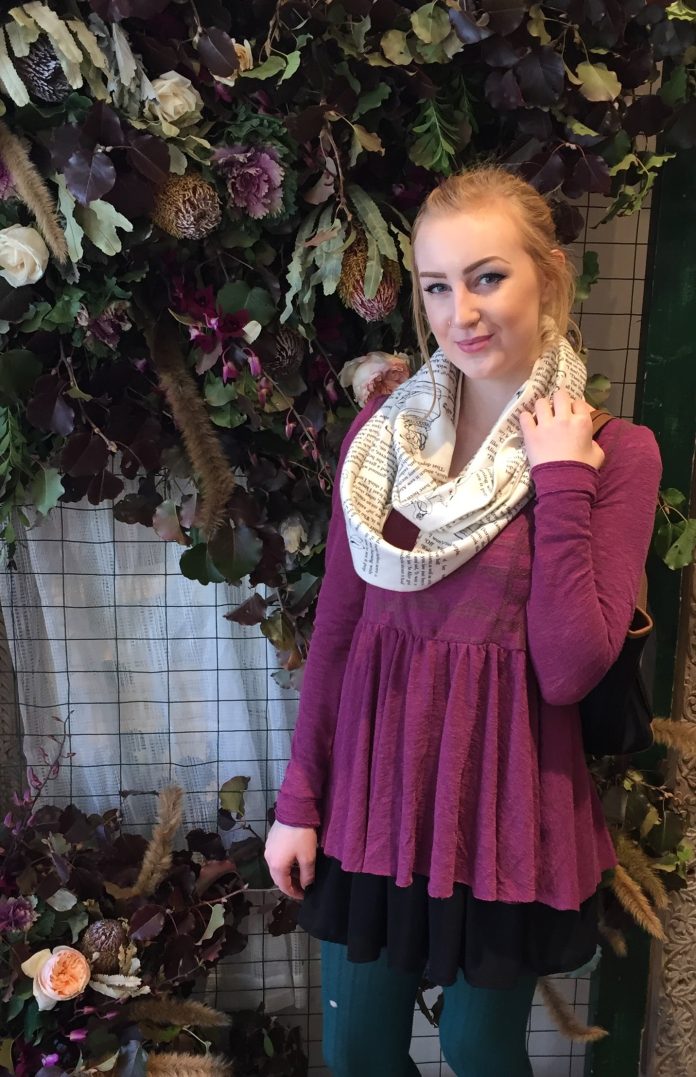The day I became a woman was not the expected landmark in my puberty, it was the day I realized I needed to be a feminist. There were many factors that culminated in this epiphanic moment, and all of them were issues that I would later find addressed by feminism.
Two years ago, at fourteen, I was obsessed with the prospect of a perfect body. Despite asthma and a lack of athletic skills, I forced myself to run every single day after school. On a warm day in June I put on my running sneakers and started my workout playlist. As I was running, I heard a harsh voice—I turned around and the biggest fear of my preteen life was realized. A middle-aged man had pulled his car up next me and was opening the passenger door. He yelled “Get in the car!” repeatedly at my trembling face. I froze, then ran in the opposite direction, only pausing at the traffic light where I met my friend–to whom I didn’t relay the story. Later, when I got home, I didn’t even tell my mother. At the time, I wanted my freedom—and I needed freedom because I wanted to burn calories. At the time, I did not understand that I had just experienced an attempted kidnapping.
The scariest part of the event was surprisingly not when a man attempted to abduct me. Instead, it was what I was told by the police, a few days later, after I told my parents what had happened. I met with a detective whom I believed would be helpful and supportive. Instead, the detective labeled me guilty: for not reporting the event earlier, but also for the running clothes I’d been wearing. In the gray box of a room, I sat with my knees hugged to my chest and listened to the detective tell me that I should not have been outside alone wearing “provocative” activewear. Then he said that if, per se, my little sister had been abducted in the time that I had waited to report the event, then her abduction would have been my fault. The shame and guilt I felt from the words of this man were the detrimental effects of victim blaming. I knew that what he said was wrong and problematic, but I did not learn what those phrases meant until later down my journey when I learned about feminism. Once that word was in my vocabulary it became my identity and I discovered that this would be part of me for the rest of my life.
I am unsure when I would have realized my feminist identity had it not been for that event. The factors are glaringly obvious: this horrifying event combined low self esteem and self hate, with the dangers of being a young woman and victim blaming. The reason I went running in the first place was because I felt strong hatred for my body and I wanted to change the way I looked. As I found myself through feminism, I discovered that body shame was a direct result of the patriarchal pressures placed on me through the media and everyday life.
The mission of the feminist movement centers on making the world a safer place for women. I was not often alone, but in that moment, while running, I was vulnerable and unsafe; I experienced a real threat to my safety and, being a young woman, my situation actualized the mission of feminism. In a nice suburban neighborhood, one would think that it would be safe for me to go on a run, in broad daylight, for that matter. However, the reality is that it isn’t safe, for when a woman’s life is objectified and valued as less than a man’s, she will not be truly safe when she is alone.
And now, as I continue to expand my views and broaden my efforts, I remember that day as a realization of my purpose as a woman.

Get ready to connect to your joy, manifest the life of your dreams, and tell the truth about who you are. This program is an excavation of the self, a deep and fun journey into questions such as: If I wasn’t afraid, what would I do? Who would I be if no one told me who I was?
Jennifer Pastiloff, creator of Manifestation Yoga and author of the forthcoming Girl Power: You Are Enough, invites you beyond your comfort zone to explore what it means to be creative, human, and free—through writing, asana, and maybe a dance party or two! Jennifer’s focus is less on yoga postures and more on diving into life in all its unpredictable, messy beauty.
Note Bring a journal, an open heart, and a sense of humor. Click the photo to sign up.


I am so sorry that this happened to you but please, please continue to tell your story. It is important and telling it will take the power of shame away. When you get to college, get involved with your college’s women’s’ center and learn everything you can about how to help those who come after you. Right on. Write on!
I am so proud to read such bright, intelligent words from someone as young as you but with an “old soul” who can help change the world. Your words are brilliant.